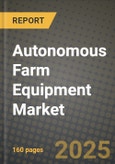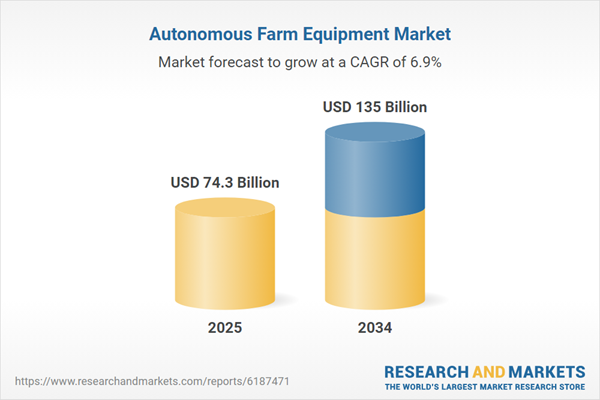The autonomous farm equipment market comprises advanced, self-operating machinery used in agricultural operations, including tractors, harvesters, planters, and irrigation systems. These solutions rely on AI, GPS, sensors, and robotics to perform tasks such as planting, crop monitoring, and harvesting with minimal human intervention. By reducing labor demands and enhancing precision, autonomous equipment offers improved productivity and sustainability, making it especially appealing in regions facing labor shortages.
The market continued to grow as major OEMs introduced autonomous or semi-autonomous farm machinery designed for large-scale and specialty crops. Farmers increasingly sought solutions to optimize resource usage, reduce operational costs, and adapt to shifting climate patterns. Technological improvements in computer vision and machine learning facilitated real-time detection of weeds, pests, and soil conditions, enabling spot treatments that minimize chemical inputs. Government support for smart agriculture initiatives and funding for precision farming projects also contributed to higher adoption rates.
Looking ahead, the market will evolve with broader applications of robotics and AI-driven analytics across the agricultural value chain. Lightweight and electric-powered autonomous machines will become more common, reducing environmental footprints. Sensor networks and data platforms will enhance decision-making at the field level, integrating satellite imagery and climate data for predictive insights. As global food demand rises, autonomous farm equipment will play a pivotal role in increasing yields, optimizing inputs, and reducing waste, ultimately transforming modern agriculture.
Key Insights: Autonomous Farm Equipment Market
- Growing popularity of cloud-based farm management systems to integrate real-time data from multiple autonomous machines.
- Use of swarm robotics for tasks like planting and weeding, allowing multiple small autonomous units to work collaboratively.
- Development of fully electric and hybrid autonomous tractors focusing on sustainability and reduced operational costs.
- AI-powered image recognition and soil analysis for precise application of water, fertilizers, and pesticides.
- Rise of robotic fruit pickers and specialized harvesters for labor-intensive crops such as strawberries and orchard fruits.
- Global labor shortages and rising labor costs in agriculture push farmers to adopt autonomous solutions.
- Advancements in AI, sensor technology, and data analytics enable higher farming precision and yield improvements.
- Government incentives and policy frameworks supporting precision agriculture and sustainable farming methods.
- Increasing demand for food security and resource efficiency amidst population growth and climate challenges.
- High initial investment costs, interoperability issues, and the need for robust rural connectivity can hinder widespread adoption.
Autonomous Farm Equipment Market Segmentation
By Product Type
- Tractors
- Harvesters
- Unmanned Aerial Vehicles (UAVs)
- Other Product Types
By Technology
- Partially Autonomous
- Fully Autonomous
By Application
- Agriculture
- Horticulture
- Animal husbandry
- Forestry
- Other Applications
Key Companies Analysed
- CLAAS KGaA mbH
- DEUTZ-FAHR S.p.A.
- AGCO Corporation
- Deere & Company
- CNH Industrial N.V.
- Agrobot S.L.
- Autonomous Tractor Corporation
- Yanmar Co. Ltd.
- Iseki & Co. Ltd.
- Kubota Corporation
- Bobcat Company
- Agribotix LLC
- Agricultural Solutions Ltd.
- Harvest Automation Inc.
- Mahindra & Mahindra Limited
- Energid Technologies Corporation
- Autonomous Solutions Inc.
- Agritronics Corporation
- Kinze Manufacturing Inc.
- SDF S.p.A.
- Rowbot Systems LLC
- Robotic Harvesting LLC
- Jaybridge Robotics LLC
- Agrobotics AutoProbe Inc.
- Naio Technologies
- CNH Industrial America LLC
- Ted Corporation
- Dino Autonomous Robot Inc.
- Swift Navigation Inc.
Autonomous Farm Equipment Market Analytics
The report employs rigorous tools, including Porter’s Five Forces, value chain mapping, and scenario-based modeling, to assess supply-demand dynamics. Cross-sector influences from parent, derived, and substitute markets are evaluated to identify risks and opportunities. Trade and pricing analytics provide an up-to-date view of international flows, including leading exporters, importers, and regional price trends.Macroeconomic indicators, policy frameworks such as carbon pricing and energy security strategies, and evolving consumer behavior are considered in forecasting scenarios. Recent deal flows, partnerships, and technology innovations are incorporated to assess their impact on future market performance.
Autonomous Farm Equipment Market Competitive Intelligence
The competitive landscape is mapped through proprietary frameworks, profiling leading companies with details on business models, product portfolios, financial performance, and strategic initiatives. Key developments such as mergers & acquisitions, technology collaborations, investment inflows, and regional expansions are analyzed for their competitive impact. The report also identifies emerging players and innovative startups contributing to market disruption.Regional insights highlight the most promising investment destinations, regulatory landscapes, and evolving partnerships across energy and industrial corridors.
Countries Covered
- North America - Autonomous Farm Equipment market data and outlook to 2034
- United States
- Canada
- Mexico
- Europe - Autonomous Farm Equipment market data and outlook to 2034
- Germany
- United Kingdom
- France
- Italy
- Spain
- BeNeLux
- Russia
- Sweden
- Asia-Pacific - Autonomous Farm Equipment market data and outlook to 2034
- China
- Japan
- India
- South Korea
- Australia
- Indonesia
- Malaysia
- Vietnam
- Middle East and Africa - Autonomous Farm Equipment market data and outlook to 2034
- Saudi Arabia
- South Africa
- Iran
- UAE
- Egypt
- South and Central America - Autonomous Farm Equipment market data and outlook to 2034
- Brazil
- Argentina
- Chile
- Peru
Research Methodology
This study combines primary inputs from industry experts across the Autonomous Farm Equipment value chain with secondary data from associations, government publications, trade databases, and company disclosures. Proprietary modeling techniques, including data triangulation, statistical correlation, and scenario planning, are applied to deliver reliable market sizing and forecasting.Key Questions Addressed
- What is the current and forecast market size of the Autonomous Farm Equipment industry at global, regional, and country levels?
- Which types, applications, and technologies present the highest growth potential?
- How are supply chains adapting to geopolitical and economic shocks?
- What role do policy frameworks, trade flows, and sustainability targets play in shaping demand?
- Who are the leading players, and how are their strategies evolving in the face of global uncertainty?
- Which regional “hotspots” and customer segments will outpace the market, and what go-to-market and partnership models best support entry and expansion?
- Where are the most investable opportunities - across technology roadmaps, sustainability-linked innovation, and M&A - and what is the best segment to invest over the next 3-5 years?
Your Key Takeaways from the Autonomous Farm Equipment Market Report
- Global Autonomous Farm Equipment market size and growth projections (CAGR), 2024-2034
- Impact of Russia-Ukraine, Israel-Palestine, and Hamas conflicts on Autonomous Farm Equipment trade, costs, and supply chains
- Autonomous Farm Equipment market size, share, and outlook across 5 regions and 27 countries, 2023-2034
- Autonomous Farm Equipment market size, CAGR, and market share of key products, applications, and end-user verticals, 2023-2034
- Short- and long-term Autonomous Farm Equipment market trends, drivers, restraints, and opportunities
- Porter’s Five Forces analysis, technological developments, and Autonomous Farm Equipment supply chain analysis
- Autonomous Farm Equipment trade analysis, Autonomous Farm Equipment market price analysis, and Autonomous Farm Equipment supply/demand dynamics
- Profiles of 5 leading companies - overview, key strategies, financials, and products
- Latest Autonomous Farm Equipment market news and developments
Additional Support
With the purchase of this report, you will receive:- An updated PDF report and an MS Excel data workbook containing all market tables and figures for easy analysis.
- 7-day post-sale analyst support for clarifications and in-scope supplementary data, ensuring the deliverable aligns precisely with your requirements.
- Complimentary report update to incorporate the latest available data and the impact of recent market developments.
This product will be delivered within 1-3 business days.
Table of Contents
Companies Mentioned
- CLAAS KGaA mbH
- DEUTZ-FAHR S.p.A.
- AGCO Corporation
- Deere & Company
- CNH Industrial N.V.
- Agrobot S.L.
- Autonomous Tractor Corporation
- Yanmar Co. Ltd.
- Iseki & Co. Ltd.
- Kubota Corporation
- Bobcat Company
- Agribotix LLC
- Agricultural Solutions Ltd.
- Harvest Automation Inc.
- Mahindra & Mahindra Limited
- Energid Technologies Corporation
- Autonomous Solutions Inc.
- Agritronics Corporation
- Kinze Manufacturing Inc.
- SDF S.p.A.
- Rowbot Systems LLC
- Robotic Harvesting LLC
- Jaybridge Robotics LLC
- Agrobotics AutoProbe Inc.
- Naio Technologies
- CNH Industrial America LLC
- Ted Corporation
- Dino Autonomous Robot Inc.
- Swift Navigation Inc.
Table Information
| Report Attribute | Details |
|---|---|
| No. of Pages | 160 |
| Published | October 2025 |
| Forecast Period | 2025 - 2034 |
| Estimated Market Value ( USD | $ 74.3 Billion |
| Forecasted Market Value ( USD | $ 135 Billion |
| Compound Annual Growth Rate | 6.8% |
| Regions Covered | Global |
| No. of Companies Mentioned | 29 |









